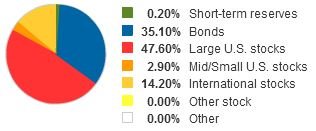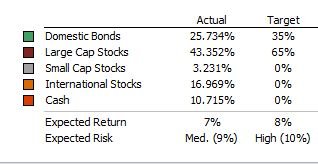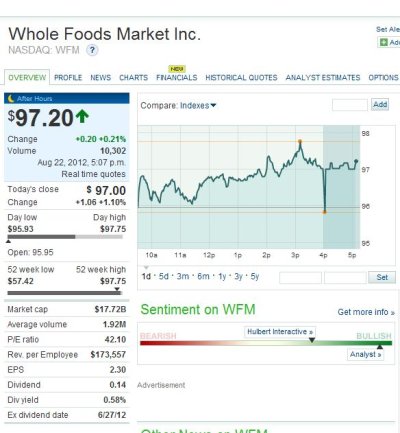PeteW
Dryer sheet wannabe
My wife and I were business owners. I'd owned small businesses for about 33 years by the time we sold our business in July of 2009. Our Children are grown and on their own, we have grandchildren. I'm 60 and my wife is 58. In 2006 we took a wonderful vacation in Greece. For some reason this vacation had a profound effect on both of us. Returning to work was just not the same. I did not want to be there anymore.
Heading into 2007 I suggested that I was ready to be done with that hectic phase of my life. My wife said she felt the same way. We decided that combined with what we already had in savings (investments) if we stayed very focused we could pay off all of our debts, mortgages, etc., while adding to our savings, and retire in 5 years. Our business was very successful by this point and things really came together, so we reached our goals in two years instead of five.
About the time we sold our business we found Bob Clyatts's book and companion workbook, Work Less Live More. We read the main book cover to cover. It was signing our song, but we did not really have the time to complete all of the workbook worksheets. Besides running our business we also sold it ourselves, so our work days were never ending.
By 2009 we had paid off the mortgages on both our commercial building and our home, our cars were paid for as well as any outstanding business loans. When we sold our business we debt free. We purposefully did not value our business as high as we could have, but we did well and our object was to sell it quickly.
Three years have passed and all has been going fairly well. We've taken a few nice trips and we're considering full-time RVing in our new-to-us 29' Airstream. So it's time to take control of our investments, all of them including the stocks, funds and bonds.
My father died in December 2010 and being the only heir I inherited his mortgage free house. Fortunately his house was not far from ours. We were able to do needed repairs and remodeling to the house ourselves and then rent it out. We currently have income from both our commercial building and the residential property. Plus we have been receiving payments from the owner of our previous business as we financed part of the sales amount (this does not always go smoothly, but it's working none the less).
For years we've allowed our portfolio to be managed for us. Although it hasn't done badly we both feel we'd like more control and understanding of what we have. We believe we'd like to set up our investments to mirror the Rational Investing Portfolio, thus reducing those management fees while gaining more control. So, we've recently cracked open Bob's books and are trying to get this done.
When it comes to our equities and bond portfolios We have hardly got a clue. Fortunately we have not had to use them Yet as a resource for our retirement income. Our broker is really no help as he does not want to work himself out of a job.
Bottom line we need some help. I just spent two hours today trying to determine asset allocation and classification for a few of the numerous stocks in our combined portfolios. After two hours I'm no closer to knowing what they are than before I began. I've tried Morningstar, Yahoo Finance and Google. I'm lost in the brush and could really use some help getting started. This is not my first attempt, to understand this stuff, but it is my first request for help.
I'm more than willing to share more details about our holdings, but have held back not knowing what is needed or appropriate. I look forward to meeting others on this site, learning and evening helping where I can.
Regards,
Pete
Heading into 2007 I suggested that I was ready to be done with that hectic phase of my life. My wife said she felt the same way. We decided that combined with what we already had in savings (investments) if we stayed very focused we could pay off all of our debts, mortgages, etc., while adding to our savings, and retire in 5 years. Our business was very successful by this point and things really came together, so we reached our goals in two years instead of five.
About the time we sold our business we found Bob Clyatts's book and companion workbook, Work Less Live More. We read the main book cover to cover. It was signing our song, but we did not really have the time to complete all of the workbook worksheets. Besides running our business we also sold it ourselves, so our work days were never ending.
By 2009 we had paid off the mortgages on both our commercial building and our home, our cars were paid for as well as any outstanding business loans. When we sold our business we debt free. We purposefully did not value our business as high as we could have, but we did well and our object was to sell it quickly.
Three years have passed and all has been going fairly well. We've taken a few nice trips and we're considering full-time RVing in our new-to-us 29' Airstream. So it's time to take control of our investments, all of them including the stocks, funds and bonds.
My father died in December 2010 and being the only heir I inherited his mortgage free house. Fortunately his house was not far from ours. We were able to do needed repairs and remodeling to the house ourselves and then rent it out. We currently have income from both our commercial building and the residential property. Plus we have been receiving payments from the owner of our previous business as we financed part of the sales amount (this does not always go smoothly, but it's working none the less).
For years we've allowed our portfolio to be managed for us. Although it hasn't done badly we both feel we'd like more control and understanding of what we have. We believe we'd like to set up our investments to mirror the Rational Investing Portfolio, thus reducing those management fees while gaining more control. So, we've recently cracked open Bob's books and are trying to get this done.
When it comes to our equities and bond portfolios We have hardly got a clue. Fortunately we have not had to use them Yet as a resource for our retirement income. Our broker is really no help as he does not want to work himself out of a job.
Bottom line we need some help. I just spent two hours today trying to determine asset allocation and classification for a few of the numerous stocks in our combined portfolios. After two hours I'm no closer to knowing what they are than before I began. I've tried Morningstar, Yahoo Finance and Google. I'm lost in the brush and could really use some help getting started. This is not my first attempt, to understand this stuff, but it is my first request for help.
I'm more than willing to share more details about our holdings, but have held back not knowing what is needed or appropriate. I look forward to meeting others on this site, learning and evening helping where I can.
Regards,
Pete
Last edited:



